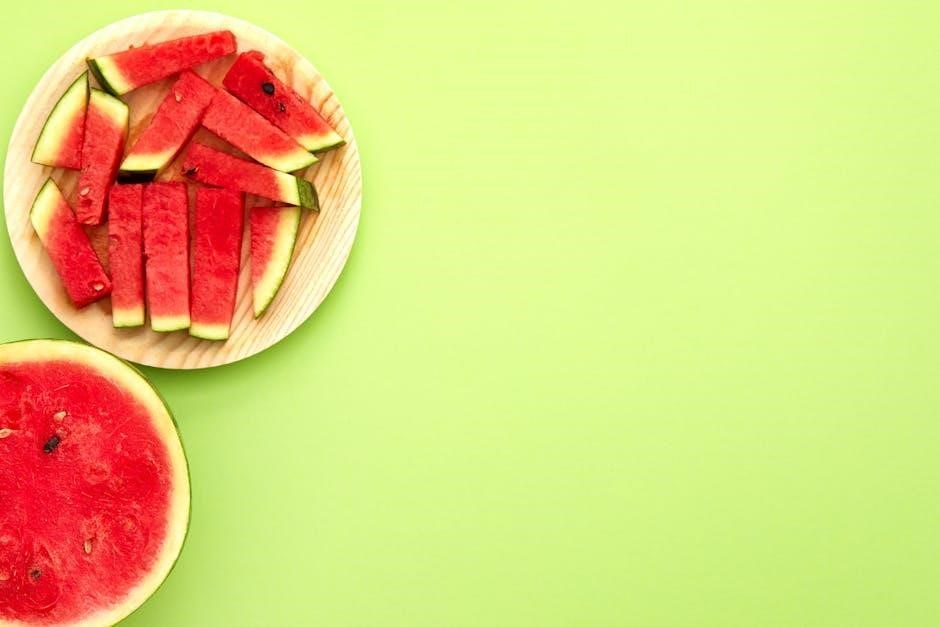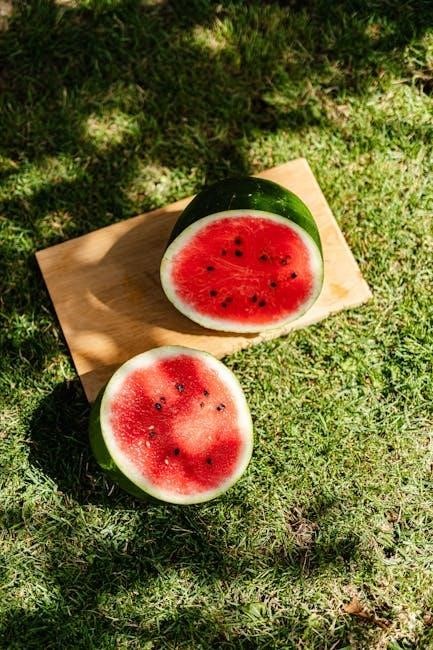A well-structured half marathon diet plan PDF provides personalized nutrition strategies, ensuring optimal energy, recovery, and performance. It focuses on balanced macronutrients, proper hydration, and timing to optimize training and race performance.
Understanding the Importance of Nutrition in Half Marathon Training
Nutrition is a cornerstone of half marathon training, directly impacting energy levels, recovery, and overall performance. A balanced diet ensures proper fueling for workouts, aids in muscle repair, and supports endurance. Without adequate nutrition, runners risk fatigue, poor recovery, and suboptimal race results. A well-planned diet tailored to training demands helps maintain consistency, prevent injuries, and enhance mental clarity. Properly timed meals and snacks optimize energy stores, while hydration and electrolyte balance prevent performance-limiting issues. Nutrition is not just fuel; it’s a strategic tool for achieving peak performance.
Overview of a Half Marathon Diet Plan PDF
A half marathon diet plan PDF serves as a comprehensive guide, detailing personalized nutrition strategies for runners. It outlines pre-training meals, mid-workout snacks, and post-run recovery diets, ensuring optimal energy and recovery. The plan emphasizes balanced macronutrients—carbohydrates, proteins, and fats—and essential micronutrients. Hydration strategies and electrolyte intake are also covered to prevent performance-limiting issues. Customizable and easy to follow, this PDF provides a roadmap for fueling your body effectively, from training to race day, ensuring peak performance and faster recovery.

Key Nutrients for Half Marathon Runners
Carbohydrates, proteins, and fats are essential for energy and recovery. Micronutrients like iron, calcium, and vitamins support immune function and performance, ensuring optimal training and race readiness.
Carbohydrates: The Primary Energy Source
Carbohydrates are the body’s primary energy source, essential for endurance and performance. Focus on complex carbs like whole grains, fruits, and vegetables, which provide sustained energy. Simple carbs, such as bananas or energy gels, are ideal for quick fuel during training and races. Adequate carbohydrate intake ensures glycogen stores are replenished, delaying fatigue and enhancing recovery. Proper timing of carb consumption before and during training is crucial for optimal energy levels and peak performance. Include a variety of carb-rich foods in your diet to maintain energy and support your half marathon goals effectively.
Proteins: Essential for Muscle Repair and Growth
Proteins are vital for muscle repair and growth, particularly for half marathon runners. They help rebuild muscle tissue damaged during training, reducing soreness and improving recovery. Include lean meats, fish, eggs, dairy, and plant-based options like beans and legumes in your diet. Aim to consume 1.2-1.6 grams of protein per kilogram of body weight daily. Timing matters—consume protein within 30-60 minutes post-workout and spread intake throughout the day. Adequate protein also supports immune function and energy production when carbohydrates are depleted.
Fats: The Secondary Energy Source
Fats serve as a secondary energy source for half marathon runners, providing sustained endurance during long runs. Healthy fats, such as avocados, nuts, and olive oil, support heart health and aid in absorbing essential vitamins. While carbohydrates are the primary fuel, fats become crucial when glycogen stores are depleted. Aim for 20-30% of daily calories from fats, focusing on unsaturated varieties. Balancing fat intake ensures energy availability and supports overall performance without compromising digestion or weight management during training. Quality sources are key for optimal benefits.
Micronutrients: Vitamins and Minerals for Optimal Performance
Micronutrients, including vitamins and minerals, play a vital role in energy production, recovery, and immune function for half marathon runners. Iron supports red blood cell production, while calcium strengthens bones. Vitamin C aids in recovery, and vitamin D enhances bone health. Zinc and magnesium are crucial for muscle function and electrolyte balance. Incorporating foods rich in these nutrients, such as leafy greens, nuts, and fortified cereals, ensures optimal performance and reduces the risk of deficiencies. A balanced intake of micronutrients is essential for peak running performance and overall health.

Hydration Strategies for Half Marathon Training
Proper hydration is crucial for endurance and performance. Monitor fluid intake, drink water regularly, and consider electrolytes during long runs to maintain optimal hydration levels and prevent dehydration.
Importance of Proper Hydration
Proper hydration is essential for peak performance during half marathon training. Even mild dehydration can impair endurance, causing fatigue and dizziness. Staying hydrated supports bodily functions, regulates body temperature, and transports nutrients. Without adequate fluids, runners risk decreased stamina and increased recovery time. Drinking water regularly, especially before, during, and after runs, ensures optimal hydration levels, preventing dehydration-related issues and maintaining overall health.
Best Practices for Hydration During Training
Proper hydration during half marathon training is crucial for performance and health. Aim to drink 8-10 glasses of water daily, adjusting for climate and sweat levels. Incorporate a hydration belt or handheld bottle for long runs. Practice race-day hydration strategies during training to avoid stomach discomfort. Monitor urine color to ensure it’s pale yellow, indicating adequate hydration. Avoid overhydration, which can lead to hyponatremia. Include electrolyte-rich beverages to maintain mineral balance, especially during intense or prolonged sessions. Consistency and awareness are key to optimal hydration.
Electrolytes and Their Role in Hydration
Electrolytes, such as sodium, potassium, and magnesium, play a vital role in maintaining hydration and bodily functions. During intense training, excessive sweating leads to electrolyte depletion, risking muscle cramps and fatigue. Incorporating electrolyte-rich beverages or tablets in water helps replenish these minerals, ensuring proper nerve and muscle function. Balancing electrolyte intake is essential for maintaining fluid balance and preventing dehydration-related issues. Adequate electrolyte levels support optimal performance and recovery, making them a crucial component of a half marathon diet plan.
Pre-Training Diet Plan
Pre-training meals should include complex carbs, lean proteins, and healthy fats to provide sustained energy and support muscle function, while staying hydrated for optimal performance.
Breakfast Options for Runners
Opt for balanced breakfasts rich in complex carbs, lean proteins, and healthy fats to fuel your runs; Oatmeal with fruit, whole-grain toast with avocado, or Greek yogurt with berries are excellent choices. Eggs, smoothies, or chia pudding also provide sustained energy. Pair with a glass of water or electrolyte drink to stay hydrated. Aim to eat 1.5 to 2 hours before training to allow proper digestion. These meals help maintain energy levels and support muscle function during intense workouts.
Lunch Ideas to Fuel Your Training
Wholesome lunches are essential for midday energy replenishment. Opt for meals rich in complex carbs, lean proteins, and healthy fats. Grilled chicken salads, whole-grain wraps with turkey, or quinoa bowls are excellent options. Include vegetables like spinach or bell peppers for added nutrients. Pair with a piece of fruit or a handful of nuts for sustained energy. Avoid heavy, greasy foods that may cause digestive discomfort. Hydrate with water or electrolyte-rich drinks to maintain performance levels throughout the day.
Dinner Recipes for Recovery
Dinner should focus on recovery and replenishment after a day of training. Include balanced meals with lean proteins like grilled chicken, fish, or tofu, paired with complex carbs such as sweet potatoes, brown rice, or whole grains. Incorporate colorful vegetables like broccoli, spinach, or bell peppers for essential vitamins and minerals. Healthy fats from avocado or olive oil support inflammation reduction. Aim for hydration with herbal teas or water. Portion control is key to avoid overeating, ensuring a restful night’s sleep and optimal recovery for the next day’s training.
Snacking Strategies to Maintain Energy Levels
Snacking is crucial for maintaining energy levels during half marathon training. Opt for nutrient-dense options like fruits, nuts, or energy bars that provide a mix of carbohydrates, proteins, and healthy fats. Hydration is key, so include water or electrolyte-rich drinks. Avoid heavy, processed snacks that can cause digestive discomfort. Timing matters—snack 1-2 hours before training and within 30-60 minutes post-workout for recovery. Practice your snack choices during training to ensure they work well on race day, avoiding new foods that could cause stomach issues.

Diet During Training
A half marathon diet plan emphasizes balanced macronutrients, proper hydration, and electrolyte intake. Focus on timing meals and snacks to optimize energy levels and support recovery during training.
Mid-Morning Snacks to Sustain Energy
Mid-morning snacks are crucial for maintaining energy levels during training. Opt for nutrient-dense options like bananas, nuts, or energy bars. These provide sustained energy and prevent fatigue. Incorporate carbohydrates and protein to balance blood sugar and support muscle function. Avoid heavy or high-sugar snacks that may cause energy crashes. Practice timing your snacks to align with your training schedule, ensuring optimal digestion and energy availability. Consistency in snacking helps maintain performance and recovery throughout your half marathon preparation.
Post-Workout Recovery Meals
Post-workout recovery meals are vital for replenishing energy stores and repairing muscles. Aim to consume a balanced meal within 30-60 minutes after training, combining carbohydrates and protein. Examples include grilled chicken with quinoa, fish with sweet potatoes, or a smoothie with banana and protein powder. These meals help restore glycogen levels, reduce muscle soreness, and support overall recovery. Proper hydration and electrolyte balance should also accompany these meals to ensure optimal replenishment and prepare your body for the next training session.
Evening Meals to Aid in Overnight Recovery
Evening meals play a crucial role in overnight recovery by replenishing energy stores and repairing muscles. Focus on balanced meals rich in lean proteins, complex carbohydrates, and vegetables. Examples include grilled chicken with brown rice and broccoli, or salmon with quinoa and spinach. Incorporate healthy fats like avocado or olive oil for added nutrition. Aim to eat 2-3 hours before bed to support digestion and recovery. Proper hydration and electrolyte balance should also be maintained to ensure your body is prepared for the next day’s training and performance.

Race Week Nutrition Plan
A race week nutrition plan focuses on tapering your diet, gradually increasing carbohydrate intake, and optimizing hydration. It ensures you’re fueled for peak performance on race day while avoiding digestive discomfort.
Tapering Your Diet Before the Race
Tapering your diet before the race involves gradually reducing calorie intake while maintaining carbohydrate stores. This strategy helps prevent fatigue and supports recovery without causing digestive issues. Focus on lightweight, nutrient-dense meals rich in complex carbs, lean proteins, and healthy fats. Avoid heavy, high-fiber foods that may cause stomach discomfort. Stay hydrated and avoid excessive caffeine or alcohol. Practice your race-day nutrition plan during this period to ensure it works seamlessly on race morning.
Carb Loading: When and How to Do It
Carb loading begins 2-3 days before the race to maximize glycogen stores. Increase carbohydrate intake to 8-10 grams per kilogram of body weight, focusing on low-fiber, high-glycemic foods like pasta, rice, and bread. Reduce fat and protein consumption to optimize carb absorption. Stay hydrated to support glycogen storage. Avoid high-fiber foods to prevent digestive discomfort. Practice carb loading during training to ensure it suits your system. This strategy ensures sustained energy levels during the race, helping you perform at your best.
What to Eat the Night Before the Race
The night before the race, focus on a balanced meal rich in complex carbohydrates, lean proteins, and minimal fiber. Opt for whole grains, vegetables, and lean meats like chicken or fish. Avoid heavy, spicy, or high-fiber foods to prevent digestive discomfort. Include easily digestible options such as bananas, toast, or oatmeal. Stay hydrated with water or a sports drink to maintain electrolyte balance. Aim to eat 2-3 hours before bedtime to ensure proper digestion. Keep the meal familiar and avoid trying new foods to minimize stomach issues on race day.
Race Morning Nutrition: What to Eat and When
On race morning, prioritize light, easily digestible foods rich in carbohydrates and low in fiber. Opt for oatmeal, toast with a banana, or a smoothie 1-2 hours before the race. Avoid heavy, fatty, or high-fiber meals to prevent stomach discomfort. Stay hydrated with water or a sports drink to maintain electrolyte balance. Avoid trying new foods to minimize digestive risks. Keep the meal simple and familiar to ensure optimal energy levels and comfort during the race. A small snack like an energy bar may be consumed 30 minutes before the start for an extra energy boost.

Nutrition During the Race
Nutrition during the race focuses on energy gels and hydration to sustain performance. Consume gels every 20-30 minutes and maintain electrolyte balance to prevent cramps. Practice strategies in training.
Energy Gels and Their Role in Fueling
Energy gels are a popular choice for mid-race fueling, providing quick, easily digestible carbohydrates to maintain energy levels. Typically consumed every 20-30 minutes, they help prevent blood sugar drops. Many gels contain electrolytes, which aid hydration and reduce cramp risk. Practice gel intake during training to avoid gastrointestinal discomfort. Choose flavors and brands that suit your stomach, and pair with water for optimal absorption. Consistency in fueling strategy ensures peak performance during the race.
Hydration Strategies During the Race
Proper hydration during a half marathon is critical for performance and health. Aim to drink 16-20 ounces of water or sports drink 1-2 hours before the race. During the race, hydrate at aid stations, consuming 7-10 ounces every 10-15 minutes. Adjust based on weather; hotter climates require more fluid. Avoid overhydration to prevent hyponatremia. Use a hydration belt or handheld bottle for convenience. Electrolytes can be consumed every 30-45 minutes to maintain balance. Practice hydration strategies during training to ensure comfort and effectiveness on race day.
Electrolyte Intake to Prevent Cramps
Electrolytes, such as sodium, potassium, and magnesium, are essential for maintaining fluid balance and preventing muscle cramps during a half marathon. Consume electrolyte-rich drinks or tablets 30 minutes before the race and every 20-30 minutes during. Sports drinks or coconut water are excellent sources. Avoid excessive intake to prevent stomach discomfort. Test electrolyte products during training to ensure tolerance. Adjust based on sweat rate and weather conditions to maintain optimal levels and prevent dehydration-related issues. Proper electrolyte balance supports performance and reduces the risk of cramping. Plan intake strategically for race day success.

Post-Race Recovery Nutrition
Post-race recovery nutrition is crucial for replenishing energy stores and repairing muscles. Consume a mix of carbohydrates and protein within 30-60 minutes after finishing. This aids in quick recovery and reduces muscle soreness, helping your body restore balance and prepare for future training.
Immediate Post-Race Snacks for Recovery
After crossing the finish line, it’s essential to refuel with nutrient-dense snacks to aid muscle recovery and replenish energy stores. Opt for a mix of carbohydrates and protein within 30-60 minutes. Bananas, energy bars, or chocolate milk are excellent choices due to their accessibility and nutritional balance. Smoothies with fruits, yogurt, and spinach can also provide vital vitamins and minerals. These snacks help reduce muscle soreness, stabilize blood sugar levels, and kickstart the recovery process, ensuring your body bounces back stronger for future training sessions.
Meal Ideas to Replenish Energy Stores
After a half marathon, replenishing energy stores is crucial for recovery. Balanced meals rich in carbohydrates, protein, and vegetables are ideal. Grilled chicken with quinoa and steamed vegetables provides sustained energy and aids muscle repair. Whole-grain pasta with lean beef and a side salad offers complex carbs and iron. Salmon with sweet potatoes and green beans is another excellent option, packed with omega-3 fatty acids for inflammation reduction. These meals support recovery, restore glycogen levels, and promote overall well-being. Pair with hydration for optimal results.
Rehydration and Electrolyte Balance Post-Race
Rehydration and restoring electrolyte balance are critical after a half marathon to replenish lost fluids and salts. Aim to drink 16-20 ounces of water per pound of body weight lost during the race. Coconut water or sports drinks can help replenish sodium and potassium. Incorporate electrolyte-rich foods like bananas, dates, and nuts to support recovery. Proper hydration ensures muscle function, prevents cramps, and aids in overall recovery. Prioritize this step to restore your body’s balance and prepare for future training.
Meal Planning and Grocery Tips
A well-organized meal plan and grocery list are essential for consistent nutrition. Focus on whole foods, lean proteins, and complex carbs to fuel your training effectively.
How to Plan Your Weekly Meals
Planning weekly meals ensures consistent nutrition and saves time. Assess your calorie needs based on training volume and weight goals. Balance carbohydrates, proteins, and fats in each meal. Schedule meals around training sessions to optimize energy levels. Include a variety of whole foods like whole grains, lean meats, and vegetables. Plan snacks to maintain energy between meals. Consider meal prepping to save time and stay on track. Adjust your plan weekly to reflect training intensity and recovery needs. A structured approach helps avoid nutritional deficiencies and supports performance.
Grocery Shopping Essentials for Runners
Grocery shopping essentials for runners focus on energy-rich foods, recovery aids, and hydration support. Stock whole grains, fruits, lean proteins, and healthy fats. Include complex carbs like brown rice, quinoa, and oats for sustained energy. Opt for lean meats, fish, eggs, and legumes for protein. Add nuts, seeds, and avocados for healthy fats. Incorporate electrolyte-rich beverages and coconut water for hydration. Don’t forget fiber-rich vegetables and antioxidants like berries for recovery. Energy bars, bananas, and trail mix are great for quick snacks. A well-stocked pantry supports training and recovery needs.
Prepping Meals in Advance for Convenience
Prepping meals in advance is a game-changer for half marathon runners, saving time and ensuring consistent nutrition. Plan meals weekly, focusing on balanced recipes. Cook proteins like chicken, beans, or eggs in bulk and portion them. Prepare overnight oats or smoothie packs for quick breakfasts. Chop vegetables and assemble salad jars for easy lunches. Store meals in airtight containers to maintain freshness. Label and date each meal for easy grab-and-go access. This strategy helps maintain training energy and recovery without sacrificing flavor or variety.
Common Mistakes to Avoid in Half Marathon Nutrition
Avoid overeating before races, neglecting hydration, and ignoring recovery nutrition. Consistency in nutrition and practicing race-day strategies are crucial for optimal performance and avoiding common pitfalls.
Overeating Before the Race
Overeating before a race can lead to discomfort, bloating, and digestion issues, negatively impacting performance. Avoid heavy meals and opt for light, balanced snacks 1-3 hours pre-race. Choose easily digestible foods like oatmeal, bananas, or whole grain toast with nut butter. Practice race-day nutrition during training to find what works best for you. Consistency and moderation are key to avoiding gastrointestinal distress and ensuring peak performance on race day. Proper fueling, not overeating, is essential for optimal energy levels.
Not Practicing Race Day Nutrition
One of the most common mistakes runners make is not practicing their race day nutrition during training. Race day is not the time to experiment with new foods, gels, or hydration strategies. Failing to test your nutrition plan can lead to digestive issues, cramps, or energy crashes mid-race. Instead, incorporate race-day nutrition practices into your training runs to identify what works best for your body. This includes timing meals, testing energy gels, and hydrating properly. Consistency builds confidence and prevents performance hindrances, ensuring you’re fully prepared for race day.
Ignoring Hydration Needs
Proper hydration is crucial for optimal performance and recovery during a half marathon. Ignoring hydration needs can lead to dehydration, causing dizziness, fatigue, and muscle cramps. Even mild dehydration can significantly impair running efficiency and endurance. Runners must prioritize hydration strategies, including electrolyte intake, to maintain fluid balance. A well-planned hydration schedule, as outlined in a half marathon diet plan PDF, ensures you stay fueled and avoid performance setbacks. Consistency in hydration practices during training is key to race-day success and overall well-being.

Benefits of a Customized Diet Plan PDF
A customized diet plan PDF offers a personalized approach, ensuring balanced macronutrients and optimal fueling strategies to enhance performance and recovery during half marathon training.
Personalized Nutrition Based on Your Needs
A customized half marathon diet plan PDF tailors nutrition to your specific needs, ensuring balanced macronutrients, hydration, and timing. It considers your training intensity, goals, and preferences, helping maximize energy levels and recovery. Personalized plans address dietary restrictions and preferences, providing clear guidelines for pre-race, during-race, and post-race nutrition. This approach helps runners avoid common mistakes like overeating or improper fueling, ensuring optimal performance and reducing the risk of fatigue or injury during training and the race.
Easy-to-Follow Meal Plans
A half marathon diet plan PDF offers structured meal plans tailored to your training schedule. It includes sample breakfast, lunch, and dinner ideas, along with snack and hydration recommendations. These plans are designed to prevent overeating or underfueling, ensuring you meet your energy needs without discomfort. By focusing on balanced, nutrient-dense meals, the plan helps optimize performance, enhance endurance, and support recovery. Clear guidelines make it easier to stick to your nutrition strategy, balancing taste and functionality for sustained success throughout your training journey.
Tracking Progress and Adjustments
Tracking your progress and making adjustments is crucial for refining your half marathon diet plan. Regularly monitor your training performance, energy levels, and recovery to assess if your nutrition plan is effective. Adjustments may include modifying macronutrient ratios, hydration strategies, or meal timing based on how your body responds. Keeping a food and training log can help identify patterns and areas for improvement, ensuring your diet evolves with your training demands for optimal performance and recovery.
A well-structured half marathon diet plan PDF is essential for optimal performance and recovery. Consistency in nutrition ensures your body is fueled and prepared for race day success.
Final Tips for Success
Consistency is key in your nutrition plan to ensure your body adapts and performs optimally. Practice race-day fueling during training to avoid digestive issues. Prioritize hydration by drinking water regularly and replenishing electrolytes during long runs. A personalized half marathon diet plan PDF can guide you seamlessly through training and race day. Incorporate balanced meals, recovery snacks, and listen to your body to avoid overtraining. With dedication and proper nutrition, you’ll be ready to conquer the 13.1-mile challenge confidently.
Importance of Consistency in Nutrition
Consistency in your half marathon diet plan is crucial for maintaining energy levels and supporting recovery. Regular, balanced meals ensure your body adapts to training demands and prevents performance decline. Aim to eat nutrient-dense foods, including complex carbs, lean proteins, and healthy fats, at consistent intervals. Proper hydration should also be a daily habit to avoid dehydration and electrolyte imbalances. By sticking to your diet plan, you’ll build resilience, reduce the risk of injuries or cramps, and ensure peak performance on race day.



